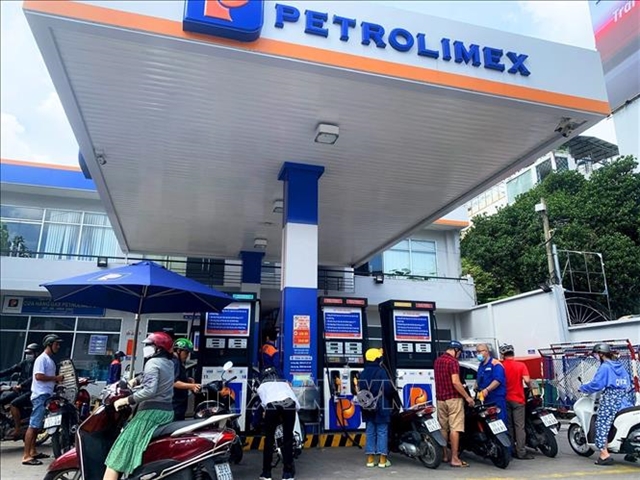 Economy
Economy


|
| Motorists People in Hà Nội queue to top up their bikes at a gas station in October. VNA/VNS Photo |
HÀ NỘI — The Ministry of Finance has proposed the government set environmental fuel tax at its floor limit for another year.
The plan, if accepted, will see environmental fuel tax for gasoline stay at VNĐ1,000 per litre, jet fuel at VNĐ3,000, diesel at VNĐ500, mazut at VNĐ300 and kerosene at VNĐ300 for an entire year.
This is a U-turn from the ministry's previous proposal, which included four different levels of fuel tax, depending on price developments in the global oil market.
Explaining their position, the ministry said global oil prices likely will stay high throughout the coming year, hovering around US$95-105 per barrel, after consultations with the Ministry of Industry and Trade.
Barring an unexpected and significant drop in global oil prices, high fuel prices will likely hurt the economy given the massive demand for fuel post-pandemic. Việt Nam's economy, which has been trying to recover from COVID-19, was forecast to require north of 14.5 million cubic metres of fuel in 2023, a 10 per cent increase from 2022.
Rising environmental fuel tax, or even rumours of it, will likely result in fuel hikes. With the Lunar New Year holidays just around the corner, it's the government's top priority to stabilise the economy, assure manufacturers and consumers and maintain favourable macroeconomic factors. This will also set the foundation for the government's effort in keeping inflation in check next year.
The environmental fuel tax, set for the entire 2023, is to expire on January 1, 2024, and to be reevaluated with developments in the global oil market in mind.
The ministry said the tax, applied to all users without discrimination, will provide a much-needed boost to manufacturing, transport, consumption and, in general, economic recovery.
In case oil prices returned to post-pandemic levels, the tax can be readjusted, even to its ceiling limit as before the pandemic.
During this year, fuel skyrocketed to a historic level high, at times to around VNĐ30,000 per litre of gasoline due to rising global oil prices and difficulties in managing supply for the domestic market. It has since come down to around VNĐ23,000 per litre after the Ministry of Finance and the Ministry of Industry and Trade, who are in charge of fuel prices, took a number of measures to address said difficulties.
The ministry stressed such a change of policy, when becomes feasible, will be in line with the Vietnamese government's unchanged position to limit the use of fossil-fuel and improve the country's environment standards and its commitments at the 2021 United Nations Climate Change Conference (COP26) to reduce net zero emissions in the future. VNS